Subscribe now and get the latest podcast releases delivered straight to your inbox.
Massive Review of Semrush: Tools, Tips, and More

Jan 3, 2021

Disclaimer: The links in this article may provide IMPACT with compensation for signups. This is no way effects IMPACT's recommendation of SEMrush.
Here at IMPACT, we always have our ears to the ground listening for the distant rumbling of the next great tool that will improve the way we do digital business -- especially when it has to do with keyword research, SEO best practices, link building, website health, and keeping a watchful eye on our competitors.
Fortunately for us (and you), SEMrush is an expansive tool that covers all of those facets and more.
In fact, there's so much to SEMrush that covering all of it would take at least a full day of reading.
So, for the sake of brevity, we'll discuss some of the key features and tools that we use the most often.
Featured tools of SEMrush
Below, you'll find list of the most common SEMrush tools we use regularly to help us in our marketing efforts.
Keyword research
We first turned to SEMrush with high hopes that it could help us better identify and target new keywords we’d like to rank for as well as show us keywords our clients' websites were already ranking for.
SEMrush has many tools to help users research keywords and blog article topics. From the new Keyword Magic tool, to the Topic Research tool, to the Organic Research tool, you're bound to find a plethora of keywords to build content around for years to come.
Keyword magic tool
This is probably my favorite keyword research tool in the SEMrush suite. In fact, it's my favorite keyword research tool period.
With over two million keywords in its data base, you're sure to find tons of keywords for your business.
You can also create up to 50 target keyword lists if you're helping multiple clients or if your business has many facets.
Simply type in ANY keyword (although I recommend typing in a short tail keyword) and you'll get instant results.
I did a quick search for "content marketing" to see what keywords I might want to pursue.
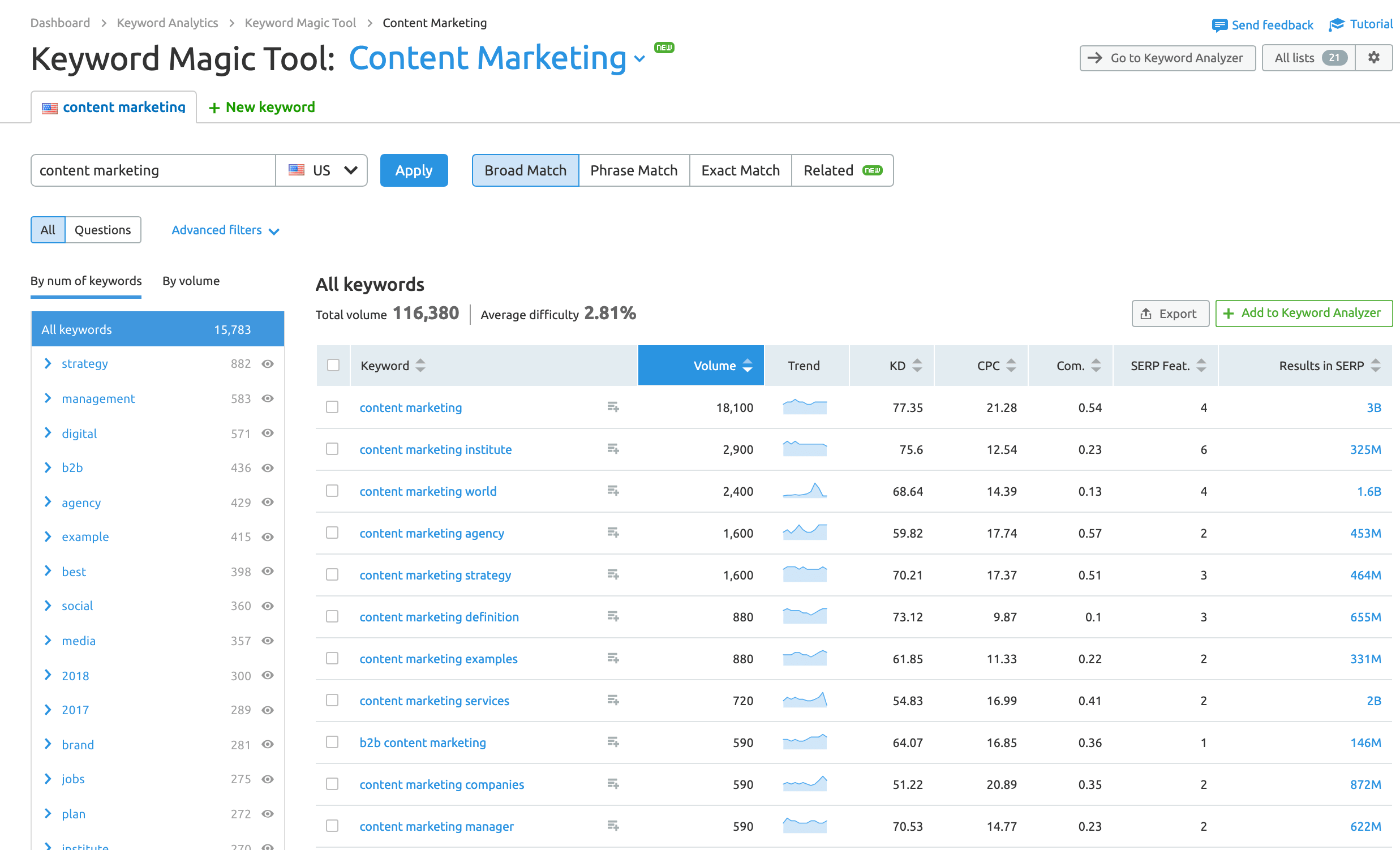
As you can see, from a quick search I can review over 116,380 keywords containing "content marketing".
I get helpful data such as:
- Long-tail keywords to pursue
- Average monthly volume of searches
- A trend graph
- Keyword difficulty
- CPC (average cost to advertise for the keyword)
- Competition for entering Adwords auctions
- Number of SERP Features found for the keyword
You can also see a table to the left helping break down commonly used keywords associated with "content marketing." Like over 880 searches contain the word "strategy."
You also have the option to check the "questions" box which will give you all the who, what, why, when, where, and how questions people type in for that keyword.
Now, all those results can be overwhelming and hard to parse through. Simply add a check into the box next to the keywords you find valuable and you can send them to the Keyword Analyzer tool for future use.
Keyword Analyzer tool
The keyword analyzer tool lets you further explore up to 1,000 selected keywords of your choosing.
From here you can:
- segment keywords further for analysis
- export them to a spreadsheet
- send them to other tools like the position tracking tool.
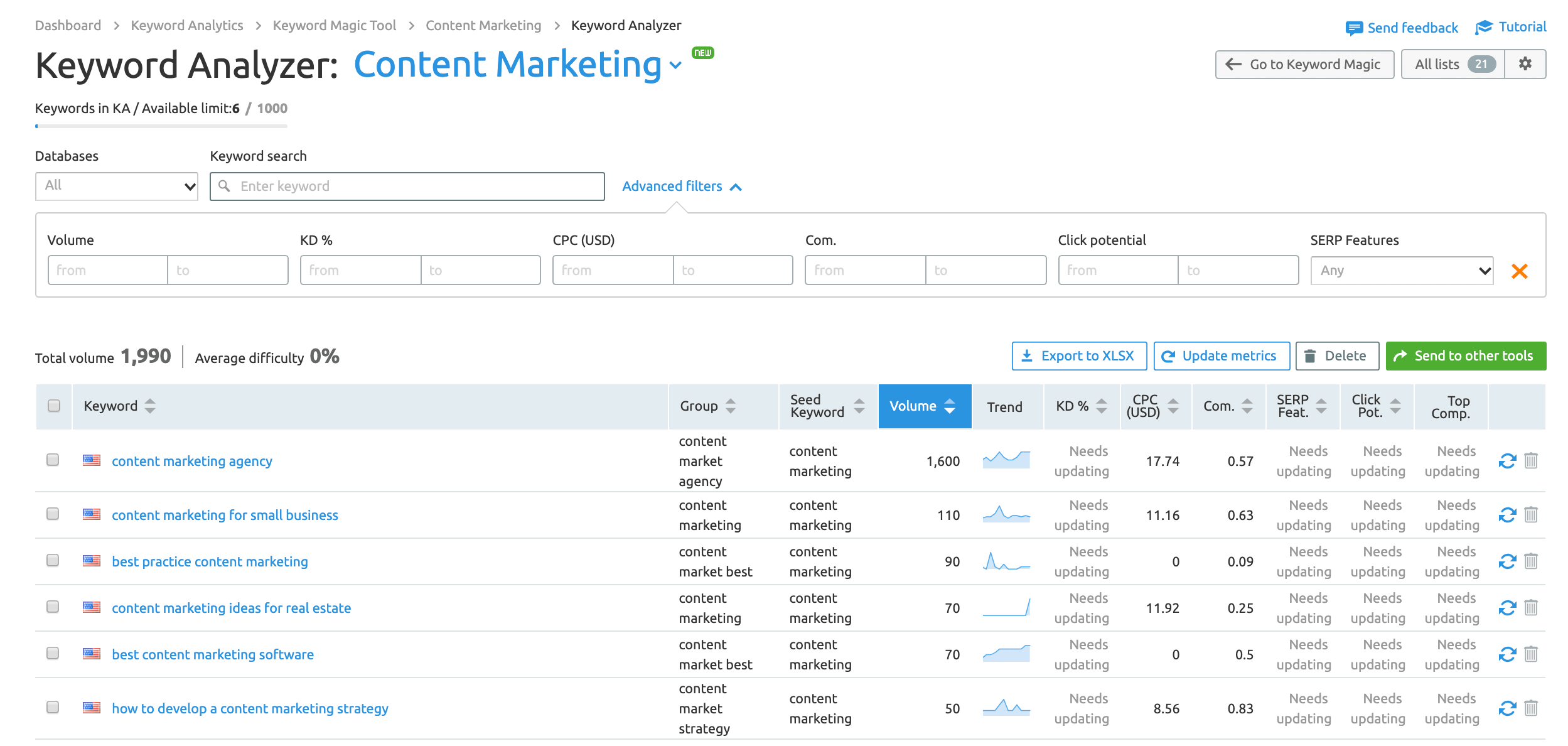
Position Tracking tool
Once you've figured out the keywords you really want to track (whether you already have pages targeting them or you're planning on creating some), you'll want to add them to the position tracking tool.
Here you get weekly updates on how you and your competitors are ranking for those keywords.
Another really cool feature is it will show you all the various SERP Features the keyword is triggering and who has those SERP Features.
You can review the specific pages you are ranking for those keywords to see if they need improvement.
You can stalk your competitors' landing pages to see what they're doing to help you get new ideas for your pages.
And one of my favorite features of the Position Tracking tool, especially if you're a local business, is you can Geo target those keywords to see how you're doing at a local search level rather than rely on your national rankings.
![]()
Domain Overview tool
With SEMrush, you don’t have to stop at researching new keywords. You can also learn a ton of information about your own website including keywords you already rank for.
Oftentimes, you may not even realize some of the keywords that are bringing traffic to your site, or the volume of traffic those keywords are bringing you.
To gather information about your own domain, simply enter your root domain into the Domain Overview tool.
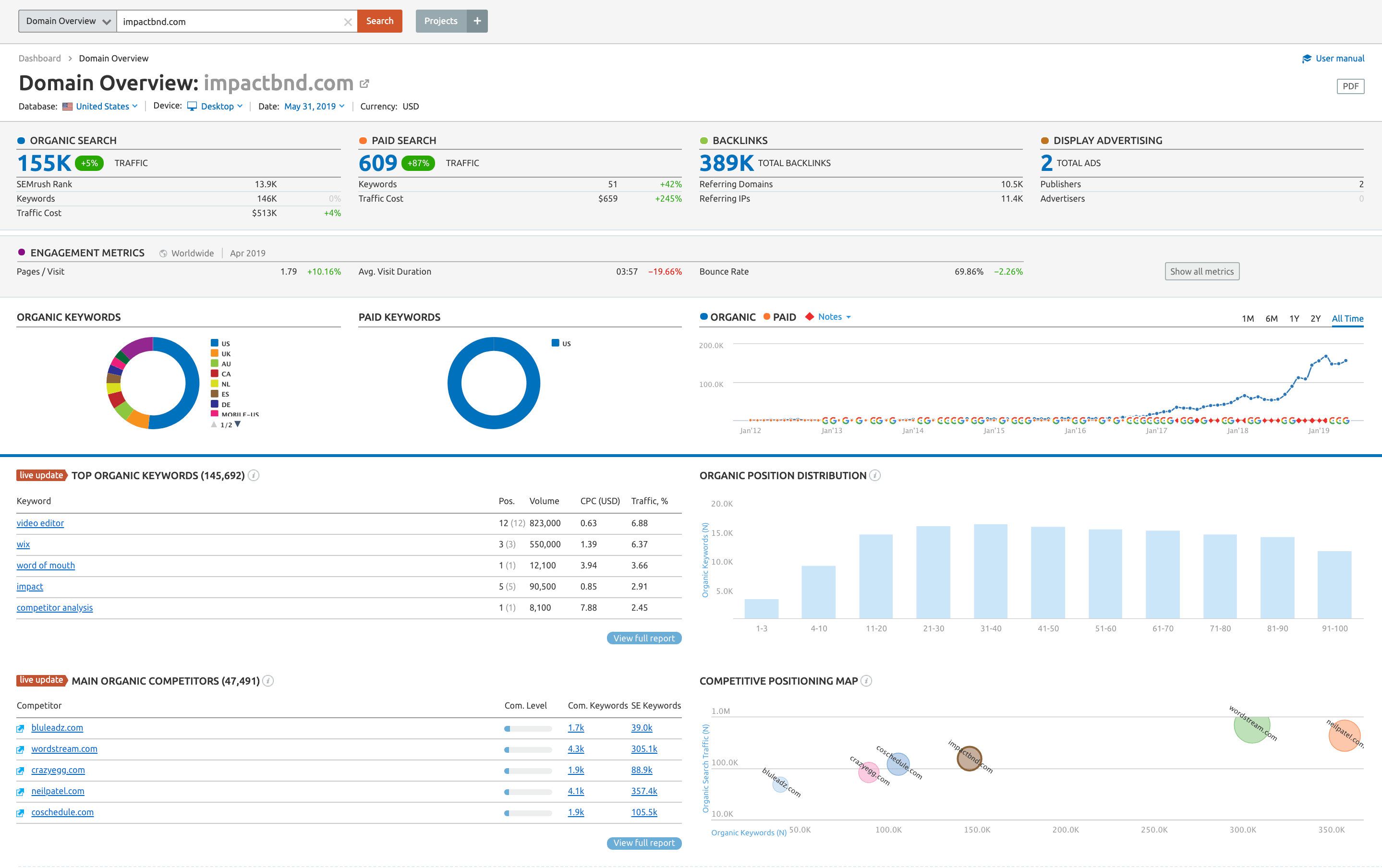
Before moving on, one thing that should be noted is that in SEMrush’s domain overview of a site, where it shows your monthly traffic, those numbers do not accurately reflect your site’s total monthly traffic.
Rather, it’s giving organic and paid search traffic from keywords that SEMrush has in its database of 120 million keywords. They use an algorithm to estimate your monthly traffic based on number of keywords, position of keywords, and average CTR of those keywords.
Your website traffic may be much higher when you calculate in direct traffic, social media traffic, and traffic from email campaigns.
With that said, let’s take a look at some of the amazing metrics SEMrush can offer in their domain search when you type in your website address:
- An overview of the amount of traffic that keywords known to SEMrush
are bringing to your site through organic traffic. - The amount of traffic you might be bringing in with paid search.
- Number of backlinks from referring domains
- Visual representations of sources for organic and paid keywords.
- A graph showing traffic by organic and paid sources over time (can choose 1 month, 6 months, 1 year, 2 years, or all time).
- The top 5 organic keywords that are bringing traffic to your site. You can click into this section for a ton more analytics (more on these metrics below).
- A graph showcasing organic position distribution, e.g., how many of your keywords rank in the top 3, how many
rank in positions 4-10, 11-20, etc. up to the top 100 results. - Who, based on traffic and overlapping keywords, are your top organic competitors. Many of the competitors listed may not even be ones you knew about. More on the organic competitors later.
- A graph showcasing a competitive position map based on
number of keywords and organic search traffic - A chart showing the top paid keywords bringing traffic to the site (can be expanded to view a full report for more metrics
- A graph showing paid position distribution of the keyword ads
you target. - A chart showing your main paid competitors (top 5 are displayed. More info can be gathered by clicking into the chart).
- A graph showing your competitive positioning map relative to how many paid keywords you, and your competitors are targeting as well as traffic brought in from PPC keywords.
- A sampling of some of your PPC ads
- Some of the backlinks that refer to your site, what those sites are and the anchor text and URL that those backlinks link to.
- The top anchor texts used in backlinks bringing referring traffic to your site.
- Referring domains that are driving traffic to your site sorted by those with the most backlinks pointing to your
webpages . - You most popular indexed pages that are back-linked by other domains.
And remember, all of this information is just an overview of the metrics.
To learn more about each set of data, you simply click on whatever metrics interest you to view full reports.
While we’re not going to get into every possible metric point (we don’t want to spoil your future exploration with SEMrush), we will discuss some of those that we use most frequently.
Organic Research tool
In the Organic Research tool you can learn a lot about the keywords you, or your competitors, currently rank for.
In the Overview tab, you get a nice graph showing your keyword growth over time. You can change this graph to show all top 10 page results, top 5 page results, top two page results, first page results, and even top three results.
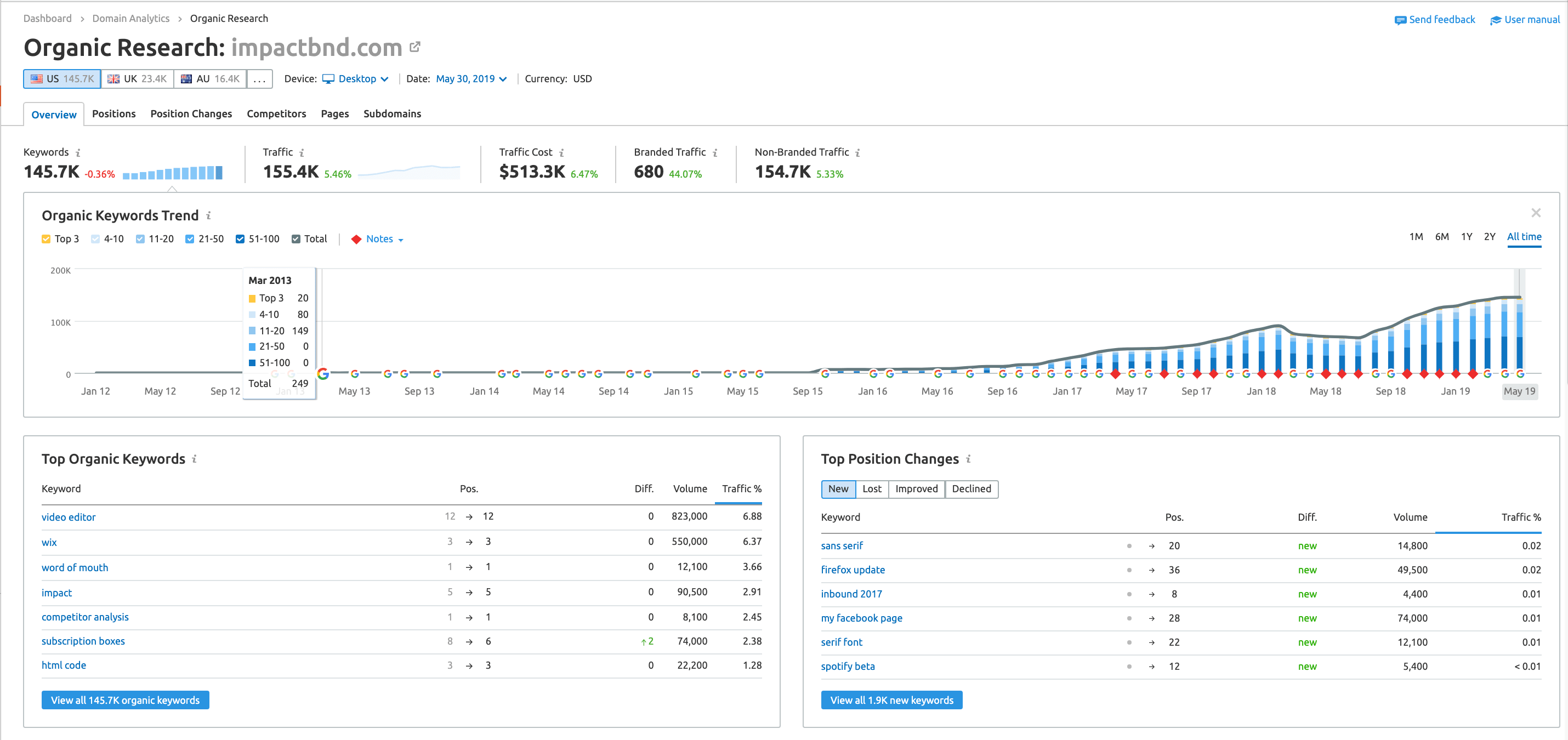
In the Positions tab, you get a complete table of ALL the keywords you currently rank for in the top 100 results.
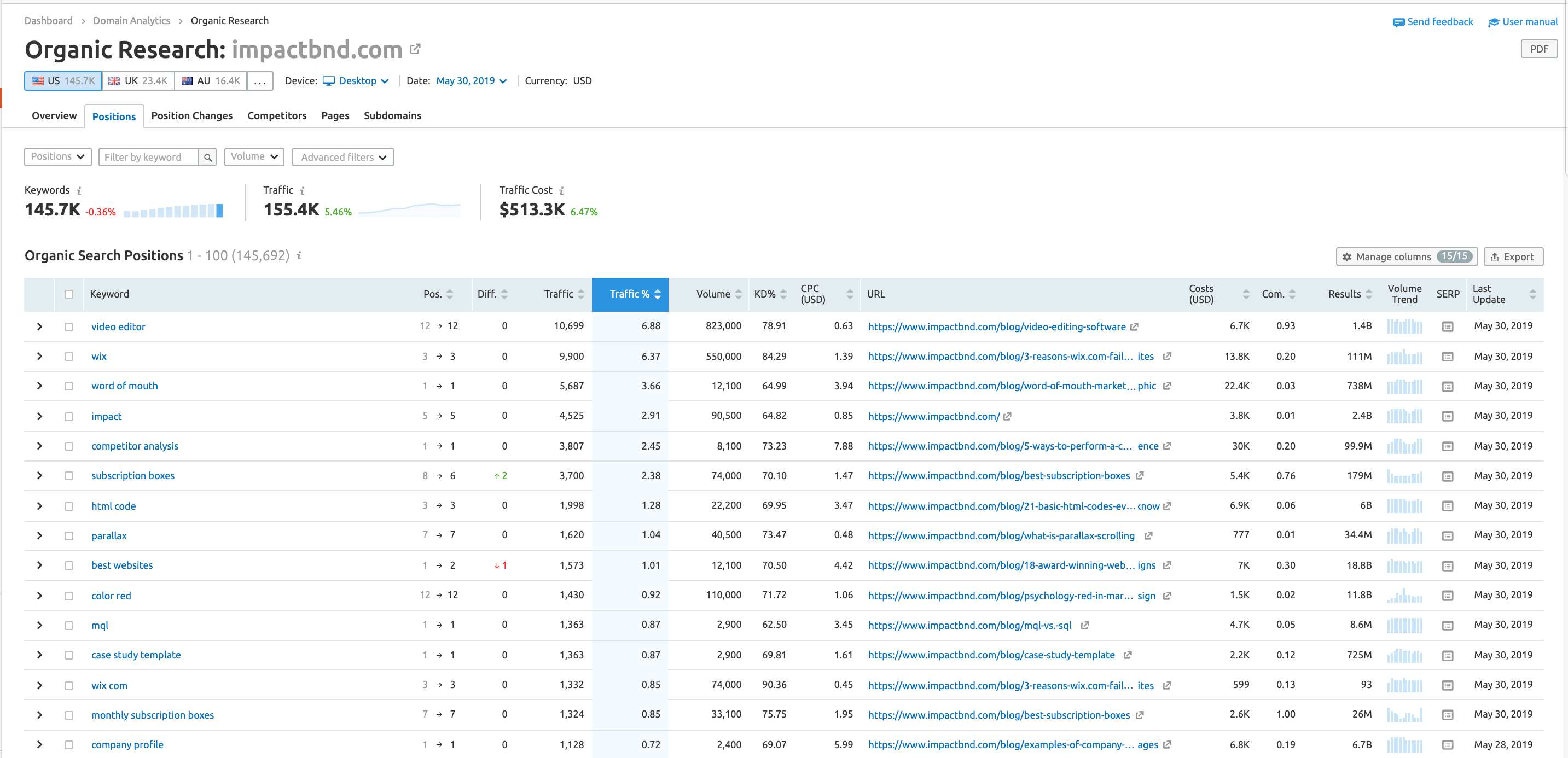
Here we can see a full set of keywords that SEMrush has information on that is bringing traffic to a website.
By default, SEMrush lists the keywords in order of those bringing the highest volume of monthly traffic. However, other data points can be used to sort the keywords such as:
- Position the keyword has for organic search results with an arrow showing the previous position.
- The difference in position gains or losses compared to the last crawl.
- The estimated number of monthly searches for that keyword.
- The Cost Per Click to advertise for the keyword.
- The URL page the keyword is associated with.
- The CPC average.
- The competitive density of the keyword for those wishing to advertise for it.
- The total number of indexed URL’s that contain the keyword
- Trends over time by
popularity of searches - The SERP, or snapshot of the first page of results in a search engine.
- And when the keyword’s data was last updated.
Note: It can take SEMrush several weeks to recrawl a keyword in this tool. If you're looking for more up-to-date information, move the keyword to the Position Tracking tool.
Checking out this feature is a great way to see exactly the keywords that are bringing you traffic, and how much of your total traffic they’re bringing. Oftentimes you may even find keywords that are performing very strongly for your site that you were not previously aware of, allowing you to retarget those keywords for better efficiency.
Keyword Gap tool
Another awesome tool found within Domain Overview is the Keyword Gap tool.
The Keyword Gap tool really helps you see how your website stacks up against others in your space that are targeting some of the same keywords as you.
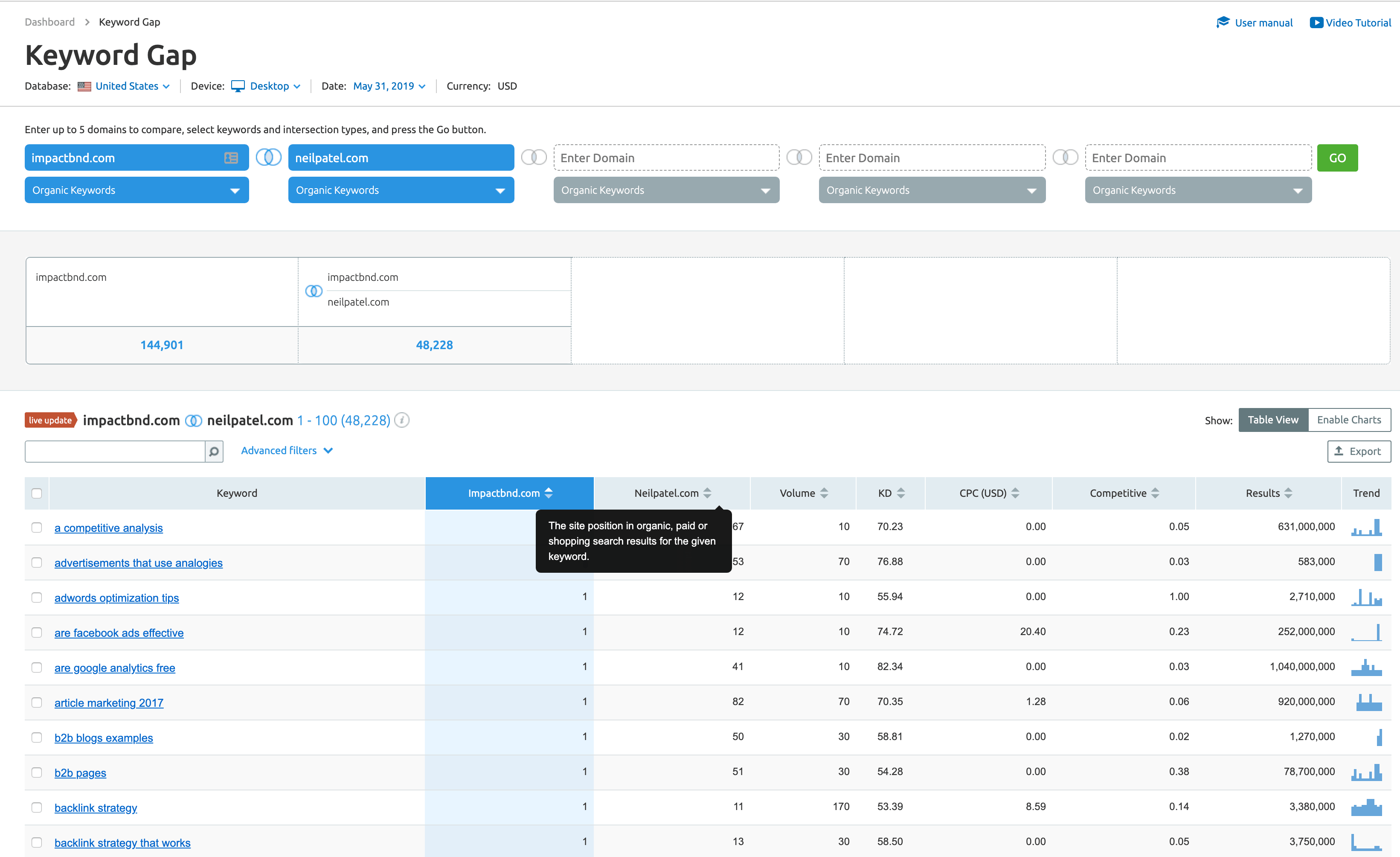
You can enter up to five websites at a time, but I recommend it's best to start with head-to-heads of your website vs a top competitor.
What you'll get with the Keyword Gap tool is (by default) a list of keywords both you and your competitor(s) have in common. You'll get to see your ranking for the keyword vs their ranking.
You'll also get information like volume, difficulty to rank for, CPC, and Adwords competition.
Another way to use the tool is to change the Venn Diagram between the websites so you can look at keywords your competitor has that you don't rank for at all.
Use the Keyword Gap tool to find keywords you rank for below your competitor and make changes to those pages to improve your rankings.
Or look for keywords they have that you don't and scrape for new content ideas.
Website review tools
If you're wanting to know how well your website and website copy is performing, SEMrush has a whole suite of tools for these kinds of metrics.
Site Audit tool
As if being able to check out all of your keywords, your competitors' keywords, and the amount of traffic you’re bringing in isn’t enough, you can also run a site audit in SEMrush to see if
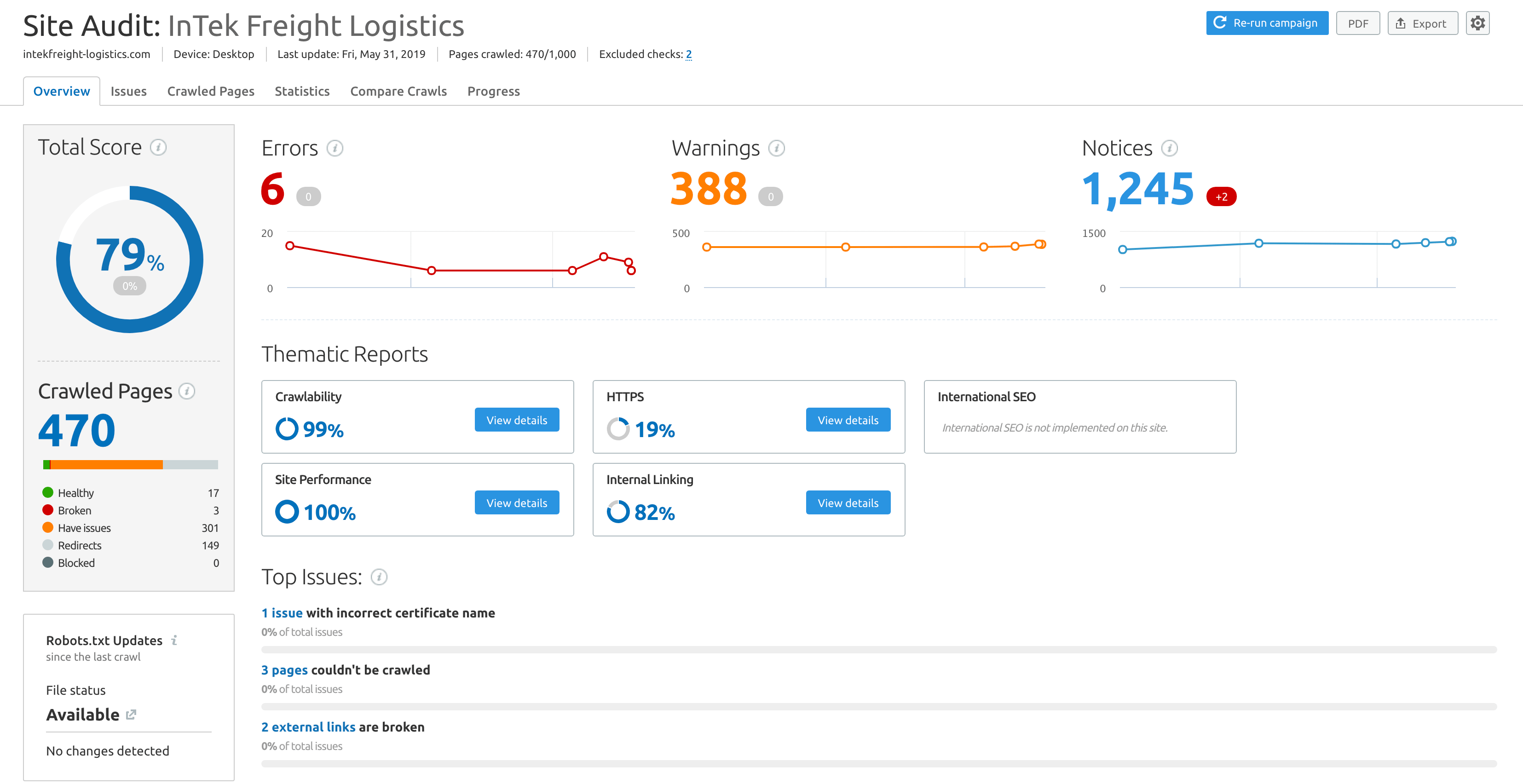
In the image above we can see a client of ours' website is scoring a pretty decent 79%.
But that doesn't mean there isn't room for improvement.
We've got at least 6 errors, 388 warnings, and 1,245 notices we can review to improve performance.
Backlinks Analytics tool
Backlinks are still one of the most important signals to search engines to help them determine the quality of pages.
While the copy itself is still the most important metric, search engines look to see how other people and websites feel about the quality of the content.
Think about it, you wouldn't link to a page that held zero value for your audience to follow. Why would you send them somewhere that didn't help them further.
Instead, you'd link to high-quality content that would be valuable for them to read.
In the Backlink Analytics tool, you can review the total backlinks to your (or a competitors website), which pages are being linked to, where those links are coming from, and how your total backlinks are growing over time.
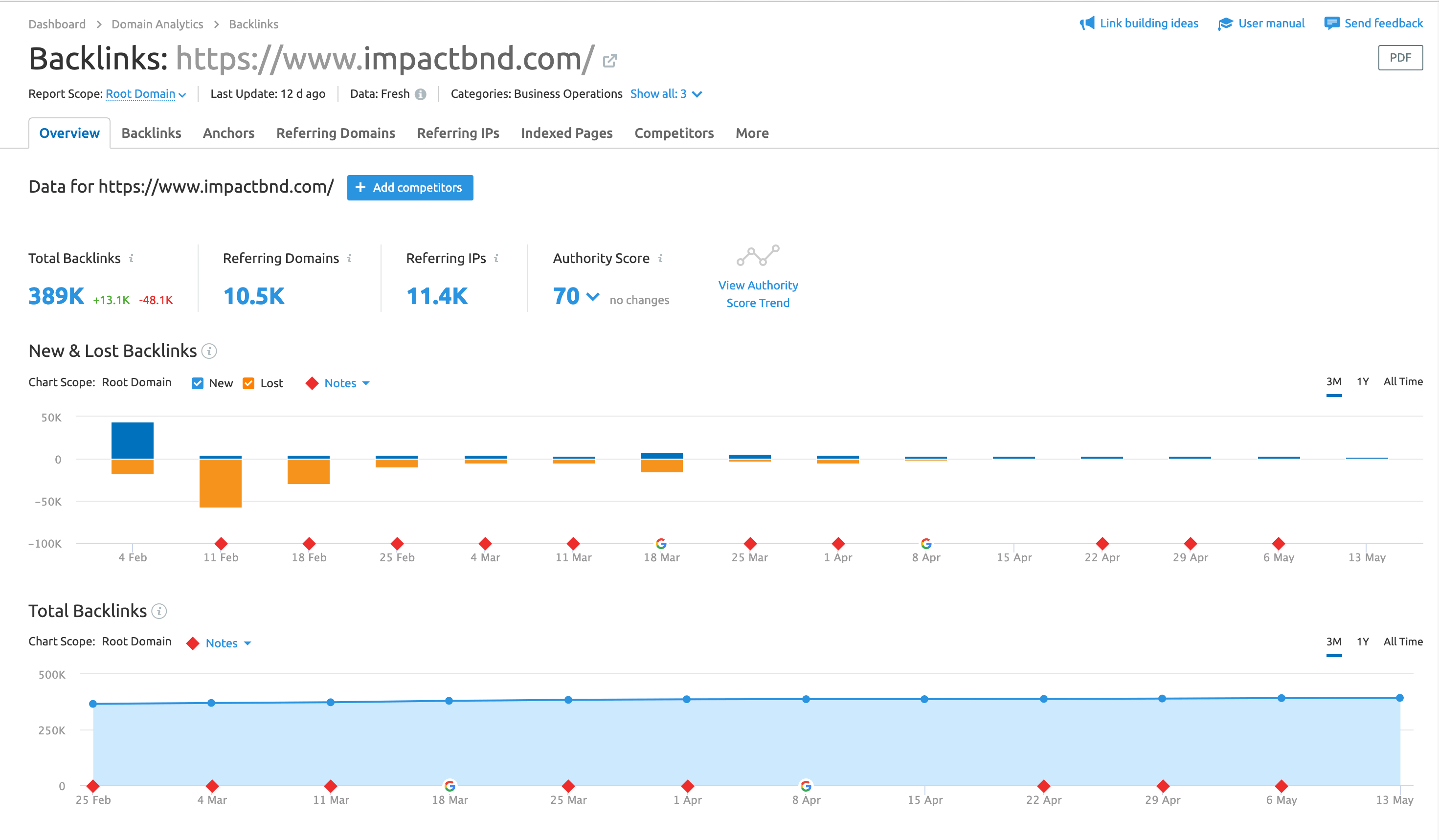
Remember, you can also use this tool to check out where your competitors are getting links from and use these as opportunities for outreach.
Backlink Audit tool
So now that you know how many backlinks you have and which domains are linking to your pages, how well can you trust those links?
Are they from reputable sources?
Do you have a bunch of links from toxic sources pointing to your website?
Even though you may have not created the incoming link yourself, too many toxic backlinks that haven't been disavowed makes Google think you don't practice good housekeeping.
Toxic backlinks can hurt the reputation of your own site, so you'll want to review your backlinks and disavow highly toxic links.
Use the Backlink Audit tool to comb through your list of toxic backlinks.
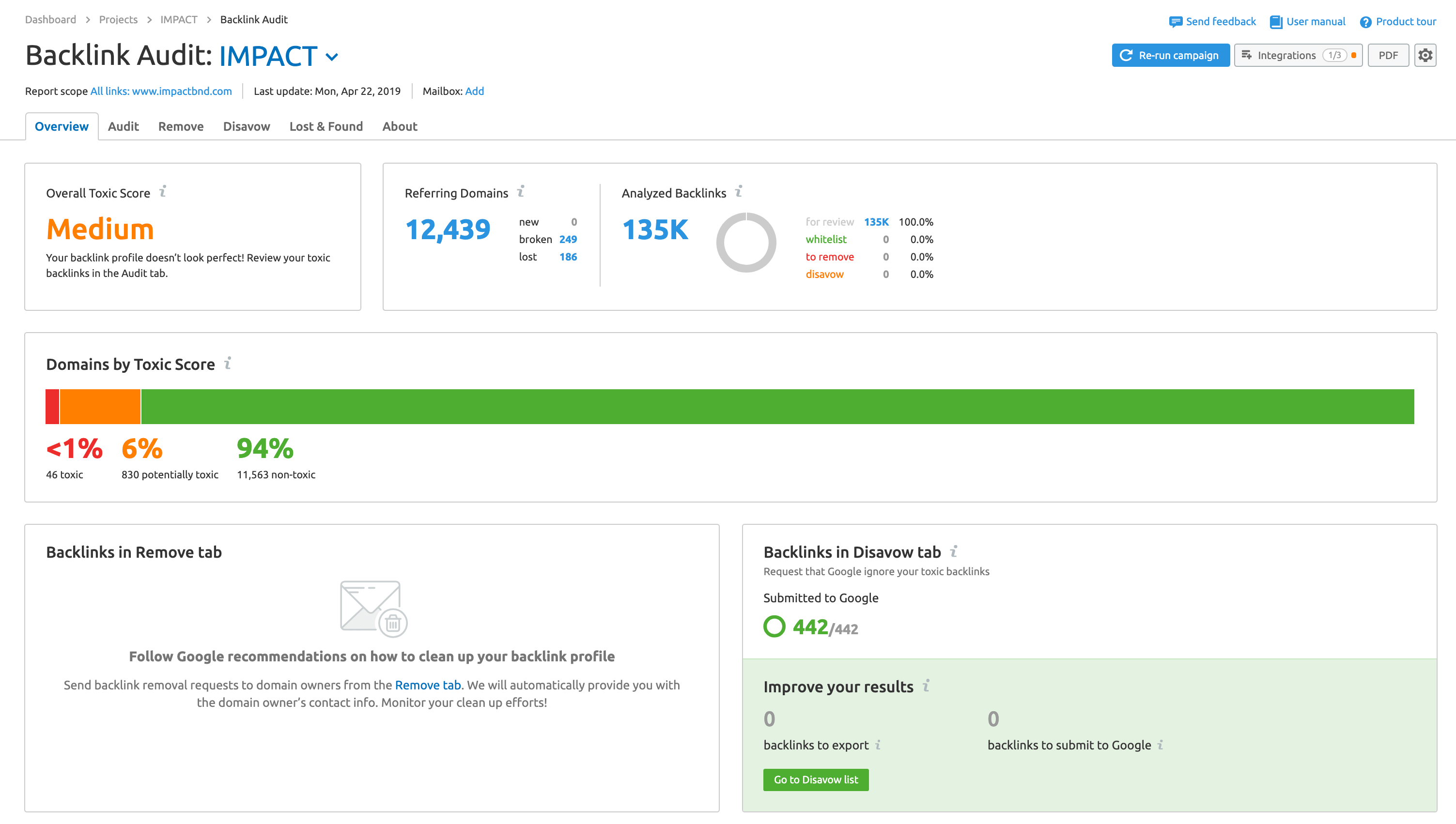
Rating for SEMrush
All in all, SEMrush is an amazing tool that can provide an overabundance of information for anyone looking to optimize their website, find the most profitable keywords to target, and/or uncover loads of information about their competitors.
From what we’ve studied (and hopefully you can now see for yourself) SEMrush is easily the best SEO keywords tool available on the market right based on the immense amount of information and metrics available for view.
However, SEMrush may not be best for the casual user as it can take quite a bit of time getting comfortable with finding all of the useful data one can compile to improve their site and keyword strategy.
Fortunately, SEMrush offers tons of resources in the forms of whitepapers, a comprehensive FAQ page, video tutorials, and regular webinars for users of all skill levels. And their support team offers detailed, helpful answers in a timely manner.
For us here at IMPACT, we easily give this amazing tool 5 out of 5 stars and will be using it for ourselves, recommending it to our clients, and recommending it to anybody who asks us about it. It really is that awesome.
With all of that said, there is still one question to address...
How much does SEMrush cost?
With SEMrush there are different plans to consider depending on the size and scope of your SEO keyword strategy you wish to implement.
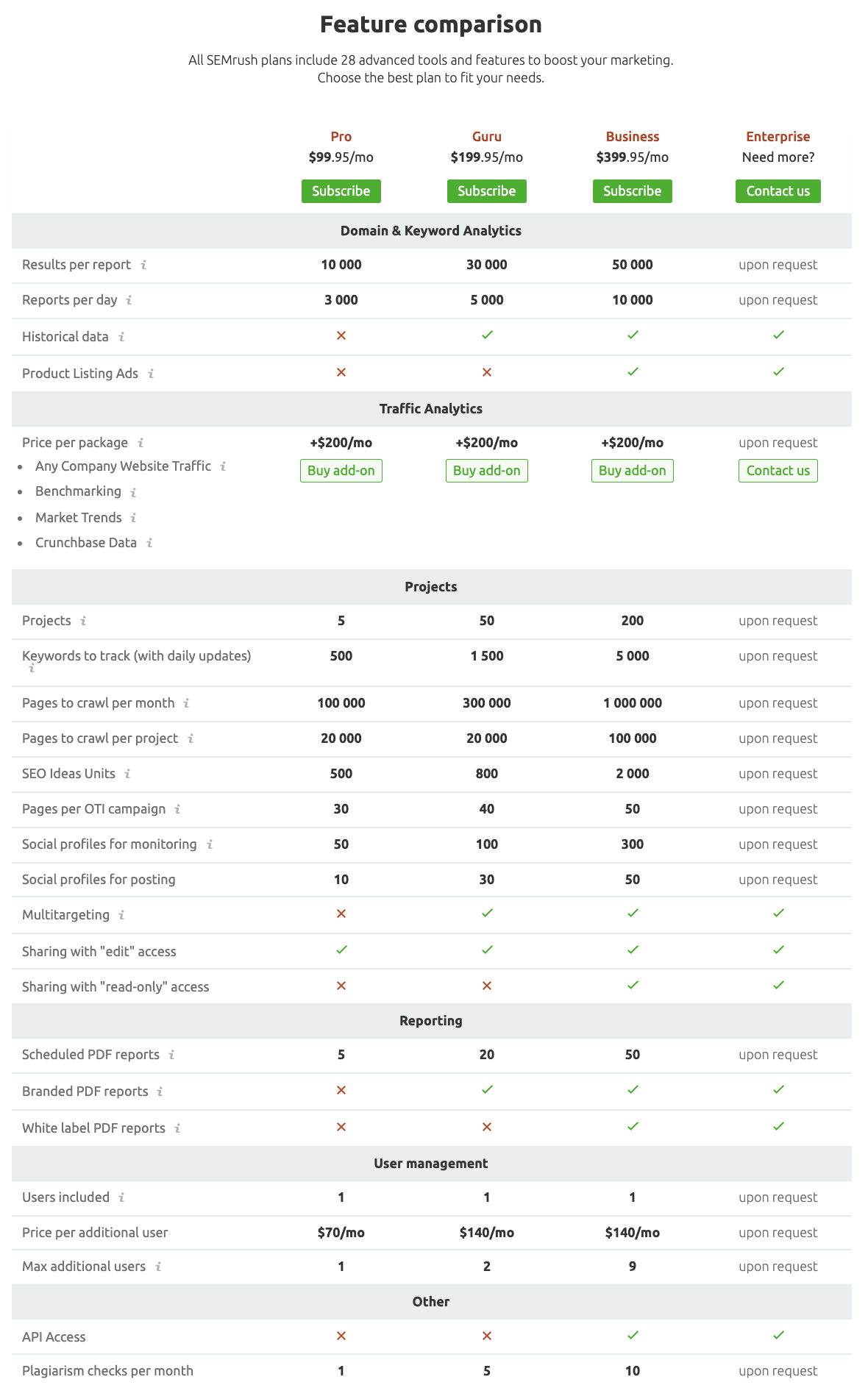
SEMrush Pro: $99.95/month
Includes:
- 10,000 results per report
- 3,000 reports per day
- 5 projects
- 500 keywords to track
- 100,000 pages to crawl
- 5 scheduled PDF reports
SEMrush Guru: $199.95/month
Includes:
- 30,000 results per report
- 5,000 reports per day
- 50 projects
- 1,500 keywords to track
- 300,000 pages to crawl
- 20 scheduled PDF reports
- Branded PDF reports
- Access to historical data
SEMrush Business: $399.95/month
Includes:
- 50,000 results per report (for each of 4 users)
- 10,000 reports per day (for each of 4 users)
- 200 Projects
- 5,000 keywords to track (1,500 per user)
- 1,000,000 pages to crawl (300,000 per user)
- 50 scheduled PDF reports (for each of 4 users)
- Branded PDF reports
- Access to historical data
- Product listing ads
- Multi-user management
SEMrush plan deals
And of course if you agree to pay annually rather than monthly, you can expect to see additional savings.
SEMrush Annual Pro Plan: $999.36
SEMrush Annual Guru Plan: $1,999.44
SEMrush Annual Business Plan: $3,999.36
As great as SEMrush may sound, you probably would like to give this tool a little hands-on demonstration and tinkering to see if it really is a good fit for your company.
Fortunately, we have a special 30-day free trial of SEMrush so you can check out all of the features for yourself.


Order Your Copy of Marcus Sheridan's New Book — Endless Customers!